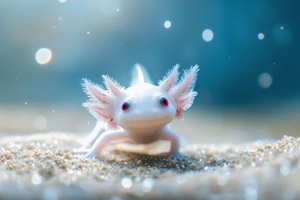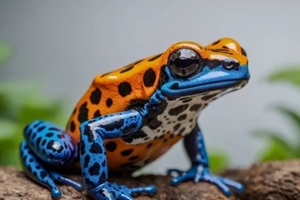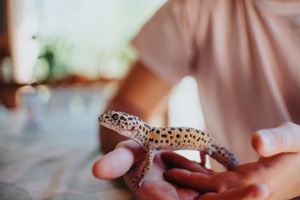 Many families enjoy having pets, but not all of them are cats and dogs. While as many as 68% of households own at least one pet, about 13% own exotics. Exotic pets run the gamut from birds and hedgehogs to axolotls, dart frogs, snakes, lizards, and more.
Many families enjoy having pets, but not all of them are cats and dogs. While as many as 68% of households own at least one pet, about 13% own exotics. Exotic pets run the gamut from birds and hedgehogs to axolotls, dart frogs, snakes, lizards, and more.
Understanding how to take care of these pets correctly means learning how their care needs differ from those of cats and dogs. While every exotic pet has species-specific requirements, many exotics benefit from the same types of attention to detail.
Here are the top 10 areas to focus on in order to keep your exotic pet healthy and happy for years to come.
Choose the Right Foods
Exotic pets might not eat food that is easily accessible. Frogs might need wingless fruit flies, lizards might need ground whole prey, and snakes might need mice or rats. Some specialty species may require even more targeted items, such as snails or certain hay varieties. Research what your animal needs and source it from high-quality providers.
Provide Enrichment
Enrichment is essential for exotic pets; it keeps their bodies and minds healthy. Enrichment means providing new and unique experiences that allow your pet to think, explore, and be their wild selves. Consider hiding treats in a puzzle toy, introducing new foods, dragging a prey item across the enclosure to create a scent trail, or placing (safe) leaves, sticks, or shredded newspaper in a pile for them to root through.
Don’t Skip Supplements
Most exotic pets will need some help meeting their nutritional requirements in captivity. Reptiles, for instance, need the right mix of calcium and D3 to avoid metabolic bone disease. Birds need cuttlebones for calcium (and beak trimming). Make sure your routine includes the right schedule for supplementation.
Monitor Care Levels
Dogs and cats can exist just fine at room temperature, but this is not always true of exotic pets. Many require supplemental heat, specialized lighting that provides UVB, carefully formulated water, and more. Invest in accurate monitoring tools, such as laser temperature guns, rather than stick-on thermometers. Don’t forget to routinely document all the parameters, such as temperature, humidity, water acidity, and more, to spot changes and fix issues.
Avoid Stressors
 For your exotic pet’s happiness, it’s important to minimize stress. Give them a quiet, dark place to sleep (unless their species requires light at all times). Avoid placing them in high-traffic areas full of movement unless this activity is too stimulating. Keep loud noises and flashing lights to a minimum.
For your exotic pet’s happiness, it’s important to minimize stress. Give them a quiet, dark place to sleep (unless their species requires light at all times). Avoid placing them in high-traffic areas full of movement unless this activity is too stimulating. Keep loud noises and flashing lights to a minimum.
Invest in Exercise
Exotics need exercise just as much as humans do. Whether this comes from handling time or a living arrangement full of twists, turns, and things to climb, make sure your pet stays active. Just make sure to be attentive to their needs, as handling can stress some species in an unhealthy way.
Decorate
Many exotic pets need to feel safe and secure to decrease stress and increase their happiness and wellness. Provide hiding places appropriate for their species. Snakes and lizards often enjoy hide boxes and logs, while birds might appreciate nest boxes or toy tents. Just be sure your decorations are not sharp or prone to falling!
Carefully Research Veterinarians
Veterinarians are the champions of pet health, and choosing the right one can make a big difference. Trustworthy exotic pet vets are hard to find, so do your due diligence in researching options. Find a vet that pursues continuing education in exotic animals and has worked with your species before. Do not hesitate to call and ask questions!
Keep Things Clean
Exotic pet enclosures come in all shapes and sizes, but no matter the arrangement, cleanliness is a priority. How often you clean depends on the species, and some animals (such as amphibians and reptiles) can be placed in a bioactive enclosure that breaks down waste on its own. Choose animal-safe cleaning products, and if you aren’t sure, don’t risk it!
Curate Household Activities
 Some activities that exotic keepers engage in daily can be more harmful to their pets than they might realize. For instance, reptiles are sensitive to airborne Teflon particles, so avoid using this cookware in the home. For many exotic pets, household activities such as burning incense and lighting candles are also unhealthy.
Some activities that exotic keepers engage in daily can be more harmful to their pets than they might realize. For instance, reptiles are sensitive to airborne Teflon particles, so avoid using this cookware in the home. For many exotic pets, household activities such as burning incense and lighting candles are also unhealthy.
Book Northern Virginia’s Top Exotic Pet Sitters
Exotic pets can bring a lot of joy to any household, but taking care of them requires a bit of practice. It can be especially hard for exotic owners to find care for their animals when they go out of town. The professionals at Paw Pals Pet Sitting can provide pet sitting services for your beloved family members, whether they have fur, scales, or feathers. Contact Paw Pals to learn more!


